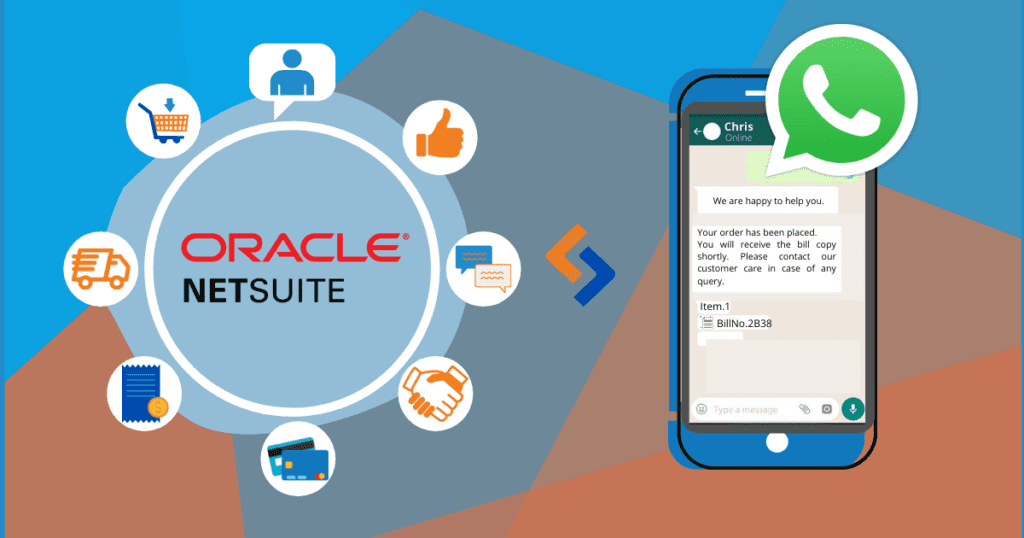NetSuite and WhatsApp integration is the way forward to automate real-time notifications and track customer interactions with respect to their orders, queries, quotes, transactions, payments, etc. Read on to find out the top five benefits of integrating NetSuite with WhatsApp.
When it comes to messaging, WhatsApp (owned by Facebook) is leading the modern-day instant messaging market. With over two billion users worldwide, it has become the most preferred communication platform across the world. This is why, companies are now using WhatsApp to communicate with prospects, customers, partners, internal stakeholders, and more. Moreover, with the launch of WhatsApp for Business (WhatsApp Business) in 2018, companies looking to send information and messages to clients and prospects in a safe, secure, and reliable way are increasingly adopting WhatsApp.
WhatsApp for Business makes it easier for companies to connect and interact with customers due to its whole host of features like catalogs, profiling, auto-responses, contact labeling, etc. However, they face challenges in tracking those interactions with customers. This is because all the customer data, orders, and payment information are recorded in the ERP or CRM systems used by these companies. Since WhatsApp does not natively integrate with these systems, businesses cannot push real-time notifications to customers regarding their order confirmation, delivery updates, payment reminders, issue escalations, and renewal reminders, etc. This affects the delivery cycles and issue resolution timelines, impacting the overall customer experience.
Why Integrate ERP/CRM with WhatsApp
Integrating ERP or CRM with WhatsApp enables faster and better tracking of customer interactions since all new inquiries or orders created in the ERP or CRM automatically get added to the WhatsApp messaging workflow. This allows pushing automated notifications and messages based on pre-defined workflow or sequence. Thus, by automating interactions and follow-ups, you can not only save time and manual efforts but also nurture the entire lead generation process, ensuring no leads slip through the cracks.
In other words, companies can push real-time notifications to prospects or customers in the context of payment confirmations, order status, issue updates, invoices, renewals, marketing communications, upon their update in ERP.
How NetSuite and WhatsApp Integration Helps
NetSuite is one of the leading business software that provides a suite of ERP, accounting and e-commerce, and CRM applications. NetSuite and WhatsApp integration enable businesses to manage customer interactions in real-time since all-new conversations and leads get automatically captured in NetSuite. In other words, you can create triggers on NetSuite to push both pre-built templates as well as custom notifications via WhatsApp without having to flip between applications and chat windows.
Thus, by integrating NetSuite with WhatsApp, customers and prospects get automatically enrolled in the pre-defined workflows and receive automatic updates related to their orders, deliveries, appointments, transactions, etc. This increases the overall response rate and customer engagement due to the automation of the supportive tasks.
Besides, there are many other benefits. Listed below are the top five benefits of integrating NetSuite with WhatsApp:
1. Faster Engagement than Emails
Instead of sending long emails, with NetSuite and WhatsApp integration, you can send real-time notifications and messages to get quick responses from customers and prospects. These real-time responses and updates keep them from losing interest in your brand. Moreover, there is no risk of messages being lost in the Junk or Spam folder, unlike emails.
Also, with automated workflows between NetSuite and WhatsApp, you can also trigger the creation of customer service tickets and update requests upon exchange of messages, which usually takes longer via email.
2. 360 Degree Customer Visibility
Since each WhatsApp conversation gets stored in the activity log of the contact account in NetSuite, along with important customer data like emails, phone calls, links clicked, demos, invoices, and other business activities, it provides 360-degree visibility into the customer account. Also, there is better relevancy and personalization, which help sales and support teams to stay on top of their requirements.
3. Automatic Lead Creation
The manual process of replying to each message individually and creating leads and support cases in CRM and ERP can be time-consuming and error prone. WhatsApp to NetSuite integration saves from this manual effort and adds to more efficiency in the overall sales and service operations. Also, upon exchange of instant messages, the sales team can act on the leads in near real-time, contrary to responding to them hours later. This increases the chances of more closure and ultimately more revenue.
4. Better Order and Sales Tracking
With WhatsApp and NetSuite integration, you can monitor and track every conversation and related processes and actions. Hence, instead of different teams monitoring information from siloed systems, this integration enables all the departments to keep track of sales and order cycles via automatic updates sent from NetSuite.
5. Message-based Account Management
Since prospects reply quickly on WhatsApp, integrating it with NetSuite enables faster lead nurturing and shortens the sales cycle. Thus, it can be a great addition for businesses that want to try message-based account management over and above email marketing or cold-calling. Also, being a lesser costly option, it makes more sense to invest in WhatsApp and NetSuite integration for increased engagement with a quick turnaround.
Wrapping Up
Needless to say, NetSuite and WhatsApp integration is the way forward to automate conversations and track activities with respect to customer queries, quotes, orders, transactions, payments, etc. All you need is an application integration tool that can help you get started.
Connect iPaaS is one of the leading app and data integration tools. Both NetSuite and WhatsApp connectors are available on Connect iPaaS to create an integration workflow in minutes using its intuitive no-code interface.
Get a free trial to integrate NetSuite with WhatsApp and see a 5X increase in the customer response rate and engagement.
RoboMQ is not affiliated, associated, authorized, endorsed by, or in any way officially connected with any of HR systems that it provides integration with and are mentioned in this post. All product and company names are the registered trademarks of their original owners.

Khushboo Chhatbar
Khushboo Chhatbar works as an Inbound Marketing Specialist at RoboMQ. She carries over 9 years of experience in executing and managing digital, inbound, and content marketing activities for the IT and software industry. She is passionate about writing for SaaS products, application integrations, and technological advancements.





